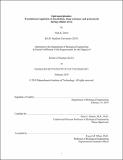| dc.contributor.advisor | Peter C. Dedon. | en_US |
| dc.contributor.author | Davis, Nick K.(Nicholas K.) | en_US |
| dc.contributor.other | Massachusetts Institute of Technology. Department of Biological Engineering. | en_US |
| dc.date.accessioned | 2020-11-06T21:07:43Z | |
| dc.date.available | 2020-11-06T21:07:43Z | |
| dc.date.copyright | 2019 | en_US |
| dc.date.issued | 2019 | en_US |
| dc.identifier.uri | https://hdl.handle.net/1721.1/128394 | |
| dc.description | This electronic version was submitted by the student author. The certified thesis is available in the Institute Archives and Special Collections. | en_US |
| dc.description | Thesis: Sc. D., Massachusetts Institute of Technology, Department of Biological Engineering, 2019 | en_US |
| dc.description | Cataloged from student-submitted PDF version of thesis. | en_US |
| dc.description | Includes bibliographical references. | en_US |
| dc.description.abstract | The epitranscriptome -- the naturally occurring system of chemical modifications on ribonucleic acid (RNA) -- | en_US |
| dc.description.abstract | is an emerging frontier of research into how changes in the cellular environment are coupled with global rates of protein synthesis. Here we report the development of new analytical and computational approaches to study mechanisms of epitranscriptomic regulation and function in the context of (1) phenotypic antibiotic resistance in bacteria, and (2) proteostasis in eukaryotes. While at least 11 major classes of RNA have been identified to date, this work focuses on transfer RNA (tRNA), the most diversely modified species of RNA that plays a central role in the initiation, elongation and termination of translation. To provide context for investigating the epitranscriptomic regulation of microbial adaptation, we first use multivariate statistical modelling to integrate time-resolved, systems-level analyses of mycobacterial persistence using an in vitro model of tuberculosis infection. | en_US |
| dc.description.abstract | Combining biochemical characterization of cellular pH and redox state, metabolic phenotyping, time-course metabolomics, whole-genome transcriptomics, and quantitative proteomics, we demonstrate that starved Mycobacterium bovis BCG (BCG) adapts to starvation by entering a ketotic state that results from coordinated metabolic shifts towards lipolysis and fatty acid [beta]-oxidation. We also show that management of toxic ketone body intermediates appears to be mediated by cytochrome P450 (CYP)-linked ketolysis and carbon cycling through CO₂ fixation, as evidenced by elevated endogenous reactive oxygen species production during starvation and the sensitivity of starved persisters to well-known CYP poisons. Using this model of mycobacterial pathogenesis, we next describe how BCG responds to nutrient deprivation by reprogramming the tRNA epitranscriptome to mediate selective translation of codon-biased stress response genes. | en_US |
| dc.description.abstract | We discuss how insights from preliminary experiments with a new in-house method, Absolute QUAntification RNA-Seq (AQUA RNA-Seq), will deepen our mechanistic understanding of this alternative genetic code, and also describe a strategy for chemotherapeutic intervention to reverse phenotypic drug resistance. Finally, we detail the development of a new high-throughput platform to identify and quantify the role of the epitranscriptome in translational fidelity in Saccharomyces cerevisiae. Our results indicate that loss of certain tRNA-modifying enzymes induces the aggregation of stress response proteins with amino acid misincorporations that map to specific codon sites. | en_US |
| dc.description.abstract | The research conducted under this thesis (1) advances our fundamental understanding of how genes are regulated at the level of translation, (2) establishes the role of the epitranscriptome in regulating cellular adaptation to physiological stringency, and (3) provides mechanistic insights into how the epitranscriptome can be engineered for the development of new RNA-targeted medicines. | en_US |
| dc.description.statementofresponsibility | by Nick K. Davis. | en_US |
| dc.format.extent | 248 pages | en_US |
| dc.language.iso | eng | en_US |
| dc.publisher | Massachusetts Institute of Technology | en_US |
| dc.rights | MIT theses may be protected by copyright. Please reuse MIT thesis content according to the MIT Libraries Permissions Policy, which is available through the URL provided. | en_US |
| dc.rights.uri | http://dspace.mit.edu/handle/1721.1/7582 | en_US |
| dc.subject | Biological Engineering. | en_US |
| dc.title | Epitranscriptomics : translational regulation of metabolism, drug resistance and proteostasis during cellular stress | en_US |
| dc.type | Thesis | en_US |
| dc.description.degree | Sc. D. | en_US |
| dc.contributor.department | Massachusetts Institute of Technology. Department of Biological Engineering | en_US |
| dc.identifier.oclc | 1202774970 | en_US |
| dc.description.collection | Sc.D. Massachusetts Institute of Technology, Department of Biological Engineering | en_US |
| dspace.imported | 2020-11-06T21:07:41Z | en_US |
| mit.thesis.degree | Doctoral | en_US |
| mit.thesis.department | BioEng | en_US |
